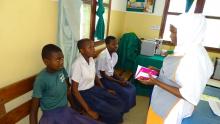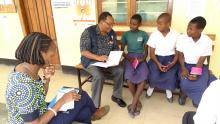Protecting girls against cervical cancer in Tanzania
Dar es Salaam, August 2018:“Tanzania has reached a huge milestone in cervical cancer prevention: every girl aged 14 years is better protected against HPV than ever before. HPV – the human papilloma virus – is the cause of virtually all cervical cancers, so this is a truly remarkable progress” says Dr. Adiele Onyeze, WHO Representative for Tanzania.
Early in April this year, Tanzania with the support from WHO and partners became one of the first countries in all of Africa to roll out the HPV vaccine nationwide, following only Rwanda, Uganda, Botswana, Mauritius, Seychelles and South Africa.
Cervical cancer is the second most common cancer in women worldwide. Tanzania is among the five countries in Africa with the highest rates of cervical cancer, a consequence of a long-term infection with the human papilloma virus. Other risk factors for cervical cancer include early marriage, multiple sexual partners, multi parity, Sexually Transmitted Illnesses including HIV infection, tobacco use, and vitamin deficiency.
Heavenlight, is among the many 14-year-old girls who have been vaccinated against human papillomavirus (HPV) since the national roll-out began in April. She received her first dose from a health facility in the suburbs of the nation’s capital, Dar es Salaam. Together with her two friends, Grace and Modesta, she is now waiting to receive her second dose, which is being made available to all girls in her age-group at schools and health facilities around the country.
Reflecting on her experience and future aspirations, she says “As far as I know, HPV vaccine is good for me. It protects me from the risk of developing cervical cancer, which can fade my hopes and dreams of becoming a successful teacher someday. I urge all girls to get vaccinated to avoid falling sick and failing to reach your dreams.”
Grace, a friend of Heavenlight says it’s hard for her to imagine that some parents can refuse to let their children get vaccinated against HPV. “Maybe it is because they don’t understand the consequences of choosing not to have the vaccine……..that they put their daughters at risk of developing cervical cancer,” she says. “I find it difficult to understand how they would want to take the risk. I thank my parents and teachers for encouraging me to get vaccinated.”
The vaccine has been introduced with support from WHO, GAVI, UNICEF and other partners targeting 14-year old girls in 2018 and 2019. Thereafter, the government plans to expand the programme to reach all girls aged between 9 and 14 in 2020 and finally a cohort of 9 year olds only in subsequent years.
For Heavenlight and her friends, they are confident about the benefits of the vaccine, for the youth and the country as a whole. “I’m hoping to become a Health Minister one day”, says Modesta smiling. “And when I do I will make sure that girls of my age get vaccinated against HPV. We are the young and future generation. HPV vaccine helps us avoid being sick, let us get vaccinated”.
“To achieve the full benefit of the HPV vaccine; it must be given to all targeted children regardless of where they live or how hard they are to reach. This requires strengthening of the routine delivery services and a good social mobilization strategy in order to get the girls to return for their second dose”, says Dr. William Mwengee, IVD Programme Officer.
WHO recommends the use of HPV vaccine as the most cost-effective public health measure against cervical cancer, as part of a comprehensive cervical cancer control strategy.





